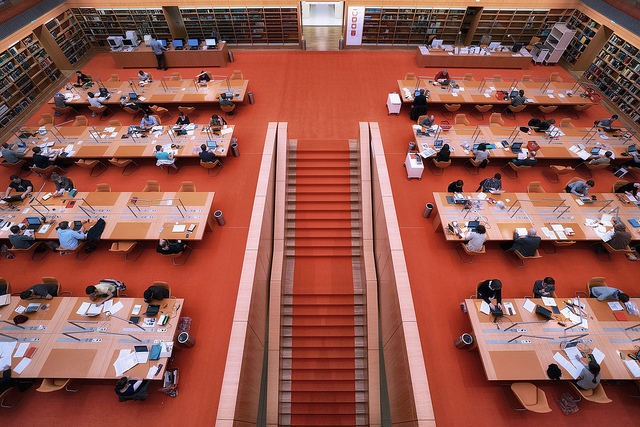"Scholarships are part of the changing aid landscape"
April 7At the Australian National University in Canberra this month, academics and industry professionals attended the inaugural Australasian Aid and International Development Policy Workshop. As Steph Carter, 23, a Commonwealth Correspondent from Brisbane, Australia writes, in the current global context of changing aid landscapes, the time old question ‘does foreign aid really work?’ took on new and bold meanings.
Does foreign aid really work? How do we measure impact? Does aid reduce poverty? Questions that we have asked ourselves for decades, yet questions we still seek answers to amidst a shifting political and economic global landscape.
In his opening address at the 2014 Australasian Aid and International Development Policy Workshop, Roger Riddell highlighted some of these challenges, speaking about the ability of current aid frameworks to reach the most marginalised, to truly capacity build and facilitate growth and sustained development. With growing middle income countries such as China and India throwing their hats in the foreign aid donor ring, the notion of ‘donor’ and ‘recipient’ as traditionally understood is turned on its head; it is a modern truth that many of the world’s poorest now live in middle income countries such as India. Riddell’s thoughts on changing aid landscapes, coupled with an opening address from the Australian Foreign Minister Hon. Julie Bishop, set a rich yet challenging backdrop for further discussions; one focused on donor responsibilities and the influence of the global political realm on aid dynamics.
In the Australian context, the 2011-2012 Independent Review of Aid Effectiveness painted a positive picture of the aid program, one supported by a four year comprehensive Aid Policy Framework, and enhanced fraud and audit transparency measures. As an important part of nearly all of Australia’s bilateral aid programs, the Australian Government delivers the large scale ‘Australia Awards’ scholarships program; an ongoing component of the aid program since the 1950s Colombo Plan. Aiming to develop capacity and leadership skills so that students can contribute meaningfully to their home country, Australia Awards operates across a range of sectors and countries, totalling approximately $331 million in the 2012-2013 financial year.
Traditionally considered a failsafe way to build linkages with partner governments, the Australian scholarships program has garnered increasing scrutiny in recent years, needing to demonstrate its effectiveness as a robust aid modality. A 2008 DAC Peer Review of AusAID’s aid programs further indicated the need for a more strategic approach to the program’s scholarships component. In light of this growing scholarships focus, discussion at this month’s ANU Australasian Aid and Development Policy Conference soon turned to scholarships and aid delivery.
In revisiting definitions of Overseas Development Assistance (ODA), the inclusion of scholarships was contested by some. ANU PhD candidate John Pickering looked at spending categories such as military aid and peace building assistance, proposing their exclusion from definitions of ODA due to their uncertain benefit for the recipient country. In a similar vein he excluded scholarships programs from ODA, suggesting that development outcomes are difficult to prove for beneficiary countries. But for some in the room, this bold proposition merely highlighted a challenge that we are all well aware of- the need for scholarships programs to demonstrate impact more widely to both the academic community and general public.
For a program like Australia Awards, where scholarship recipients must return home and contribute to development outcomes, greater focus has been placed on ways to measure development impact. Scholarship alumni form an essential part of program monitoring and evaluation, as their post Award feedback and contributions build the causal link between scholarship and recipient country development impact. The Australian Aid program currently supports alumni networks in more than 20 countries and regions, encouraging these alumni to take part in post award monitoring and evaluation activities, such as surveys and maintaining reintegration plans. More recently, these evaluation activities have included tracer studies across various countries, and the publication of individual alumni success stories, promoting the development impact of alumni to both the MDGs and their home country. But what more can be done to promote scholarship programs as a key part of the foreign aid narrative? This was a key question asked during workshop proceedings.
It is evident that Australia’s scholarships scheme will hold its own as a longstanding aid modality, and also broaden in scope with the 2013 launch of the new Colombo Plan. What can and will evolve, however, is thinking around how best to evaluate and communicate the ongoing contribution of a scholarships program to country development outcomes. With modern technologies offering new forums for program-alumni dialogue, academic and industry professionals alike will no doubt continue efforts to link scholarship skills with development impact at an organisational and country level.
As Roger Riddell alluded to, the moral drivers of foreign aid remain strong amongst donors. ‘Against this backdrop, the fundamental question we should ask ourselves is not whether foreign aid works, but how it can be made to work better from a development perspective’. In proving their importance in the foreign aid narrative, scholarship programs find themselves taking on this challenge with growing momentum.
photo credit: Novowyr via photopin cc
…………………………………………………………………………………………………………………
About me:
I am 23, and currently work for GRM International on international aid programs. I am also studying a Masters of Business and Integrated Marketing Communications through Queensland University of Technology
…………………………………………………………………………………………………………………
Opinions expressed in this article are those of the author and do not necessarily represent the views of the Commonwealth Youth Programme. Articles are published in a spirit of dialogue, respect and understanding. If you disagree, why not submit a response?
To learn more about becoming a Commonwealth Correspondent please visit: http://www.yourcommonwealth.org/submit-articles/commonwealthcorrespondents/
…………………………………………………………………………………………………………………





